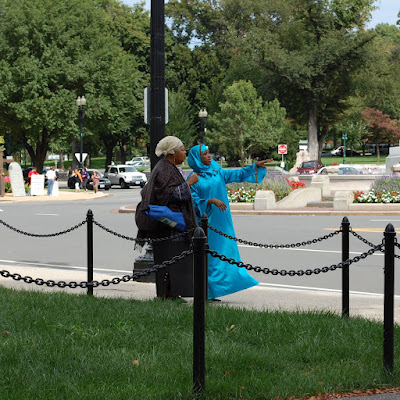Islam On Capitol Hill
Our day started out great. The weather had cooled about ten degrees, with a threat of rain. We took our umbrellas. We were on our way to The Capitol Building. We walked from a Foggy Bottom hotel to the Ellipse, where we relieved ourselves (well, at least VB did) and sat while enjoying the sights, such as the one below. Segways can be rented to tour the Capitol. Something we didn't know, but became apparent after seeing numerous nerdy people on them, all over the place.
Below: A geek on a Segway taking a photo of the geese, no doubt, as there was really nothing else there. Would VB lie to you? Believe me you, things change from just plain strange to outrageous on this day.
VB wanted to walk to The Capitol Building for two reasons: (1) She had never seen it before, from the Mall view - close-up and personal; (2) We were informed by our Pakistani doorman that a major Jumaa pray-in event was scheduled, and 50,000 Muslims were to be there at 1:00 PM on Friday! VB performed her usual Google search and found Islam On Capitol Hill, with all the details. That's a got-to-see thing. A be-in for any Muslim worth their snuff. Sort of like a March On Washington for Muslims. Amazed, VB had settled on walking down there to view the event. And, as we all know, nothing goes as planned.
First there were the protesters. As we approached The Capitol, this is what we saw, below.
Question: When do they start burning the crosses?
As we got closer, the protesters were gathered at strategic points (of course) to annoy all who passed by, and particularly Muslims attending this event. The speaker below reminded VB of the protesters at the Republican National Convention, 2004, in New York City. All these people are comparable to the God Hates Fags group, from the Westboro Baptist Church in Topeka, Kansas headed by Fred Phelps. Apparently God hates all those who don't agree with Mr. Phelps. All these protesters are more concerned with what happens after death, than how we conduct ourselves during our lifetime.
From The Washington Post, Muslim Prayers at Capitol Stir Protests: "The event, called "Islam on Capitol Hill," is designed to highlight how U.S. Muslims can coexist with their fellow Americans. Hassen Abdellah, the lead organizer of the event, called on people to come to the Capitol to "pray for peace and understanding between America and its Muslim community.""
"But this week, some conservative Christians have called the event a threat to Christian values."
Here (below) the megaphone for one of the protesting groups.
We crossed the street towards The Capitol, and it looked blocked off, so we turned around. This is the group with the above mentioned megaphone. What caught VB's attention was the "Jail To The Chief" banner. Yep! That's got religion (ahem, racism) written all over it!
Below - This is about twenty minutes before the Jumaa Prayers are to begin, and the attendance looks small.
We sit for awhile, as we've walked at least two miles from Foggy Bottom. Some of the attendees (below) gather at the Capitol Reflection Pool to dress (and possibly wash their feet?) Meanwhile, some Christian Indians (South Asian) decide to try to convert us from our fallen away lives to saving our souls - that's what matters the most you know - saving souls. They don't want us to get Left Behind.
Below - A few attendees, in bright dishdashas, cross the street towards The Capitol Building.
Below - Protesters on another corner - arguing.
Below - VB climbs onto the wall around the Reflection Pool for a better shot.
Below - The view behind VB. You can clearly see the Washington Monument straight ahead, with the National Book Fair tent in front, and the Smithsonian Castle protruding to the left. It's quite a sight.
Below - The two most annoying people in the universe this day. They persisted in standing at the corner where most prayer attendees were dropped off, screeching into a megaphone sins, should people not follow the one, the only, Jesus Christ. Pathetic that these people don't understand that Islam views Jesus as a prophet, as well. Oh, and that fornication sin with the special coloring - how in hell would we have any embryos or unborn babes to save if people didn't fornicate, and furthermore, perhaps this sad soul's parents should have had safe sex, or no sex at all!
Below - A video VB took with her new iPhone. She personally heard the guy with the megaphone declare, as he pointed across the street toward the prayer meeting, "This is a declaration of waaaar!" The video is rather boring, since he tamed his rhetoric down to mediocre religious punditry once he got on to his megaphone. Still, it was annoying - very, very annoying. At one point VB heard a police officer declare, "All those people (protesters), are ex-child offenders, wife abusers, alcoholics, and / or drug addicts." That was nice! No that was actually sweet!
Below - As we cross the street, this man is holding signs and declares, "I'm here in peace. You'll get no argument." Why does VB not trust him?
Then, just as we pass him, the toxic group appears - the ones that accost you, argue with you, and try to stop you, and eventually make you so angry you want to smite them (like with your umbrella)! We passed right by, while they were in the midst of arguments with other passers by, as you can see below.
We finally figured out (duh) that we could just walk right in to the prayer meeting ourselves - which we did. This photo below is from inside the lines, up close (but not too close) and personal (not really). The Boss Man was pushing VB to leave as we had another engagement. The prayer meeting was running late - very late - like forty-five minutes late.
Below - One of the Indian Christians predicted that he thought the crowd would swell to five thousand people for the meet. He said they had quite a good publicity show. Really? VB only knew of it a couple of days before, and no news agencies seemed to be covering it at all.
VB's last shot from the wall, before leaving, and there's no way this crowd will make fifty thousand, much less five thousand! Sad but true. According to the Washington Post, which has a great video at the link, and the only news outlet that seemed to care enough to even mention this event, At Capitol, a Day of Muslim Prayer and Unity: "Nearly 3,000 people gathered on the west lawn of the Capitol on Friday for a mass Muslim prayer service that was part religion and part pep rally for the beleaguered U.S. Muslim community.""We wanted to bring people out to show you don't need to fear America," said Imam Ali Jaaber of Dar-ul-Islam mosque in Elizabeth N.J., the service's main organizer. At the same time, he said, he wanted to remind non-Muslims that "we are decent Muslims. We work; we pay taxes. We are Muslims who truly love this country.""
Across the street from the service, Christian protesters gathered with banners, crosses and anti-Islamic messages. One group, which stood next to a 10-foot-tall wooden cross and two giant wooden tablets depicting the Ten Commandments, was led by the Rev. Flip Benham of Concord, N.C.
"I would suggest you convert to Christ!" Benham shouted over a megaphone. Islam "forces its dogma down your throat." A few Christian protesters gathered at the rear of the Muslim crowd, holding Bibles and praying.
At one point, organizers asked them to tone it down.
"We would never come to a prayer meeting that you have to make a disturbance," Hamad Chebli, imam of the Islamic Society of Central Jersey, said from the lectern. "Please show us some respect. This is a sacred moment. Just as your Sunday is sacred, our Friday is sacred.""
VB says, "Amen!"

Below: The belligerence doesn't end, as we try to leave.

We walked around the way we arrived. This is the view from the other side of the Capitol Building, as we depart.

Below: More photos of some of the attendees.



And VB wonders, where the hell is Louis Farrakhan?
















